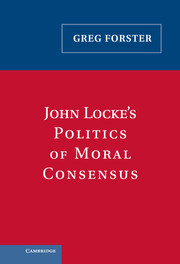Book contents
- Frontmatter
- Contents
- Acknowledgments
- List of Abbreviations
- John Locke's Politics of Moral Consensus
- 1 “Reason Teaches All Mankind, Who Will But Consult It”: John Locke and Moral Consensus
- 2 “Sit Down in Quiet Ignorance”: Locke's Epistemology of Limits
- 3 “The Candle of the Lord”: Locke's Rational Faith
- 4 “The Only Foundation of Faith”: Reasonable Christianity
- 5 “The Only True Touchstone of Moral Rectitude”: The Religious Foundations of Morality
- 6 “'Tis Reasonable to Think the Cause Is Natural”: Locke's Religious Eudemonism
- 7 “The Servants of One Sovereign Master”: Authority and Moral Consensus
- 8 “The Opinion of This or That Philosopher Was of No Authority”: Locke and Us
- Notes
- Bibliography
- Index
8 - “The Opinion of This or That Philosopher Was of No Authority”: Locke and Us
Published online by Cambridge University Press: 17 August 2009
- Frontmatter
- Contents
- Acknowledgments
- List of Abbreviations
- John Locke's Politics of Moral Consensus
- 1 “Reason Teaches All Mankind, Who Will But Consult It”: John Locke and Moral Consensus
- 2 “Sit Down in Quiet Ignorance”: Locke's Epistemology of Limits
- 3 “The Candle of the Lord”: Locke's Rational Faith
- 4 “The Only Foundation of Faith”: Reasonable Christianity
- 5 “The Only True Touchstone of Moral Rectitude”: The Religious Foundations of Morality
- 6 “'Tis Reasonable to Think the Cause Is Natural”: Locke's Religious Eudemonism
- 7 “The Servants of One Sovereign Master”: Authority and Moral Consensus
- 8 “The Opinion of This or That Philosopher Was of No Authority”: Locke and Us
- Notes
- Bibliography
- Index
Summary
Throughout this book, while examining how Locke built his epistemological, theological, and political theories in reaction to the cultural fragmentation of his day, we have sought to hold contemporary political concerns at a critical distance in order not to distort our reading of Locke. But our ultimate purpose has obviously been political. At the beginning of the twenty-first century, we stand in need of an epistemology that will steer us between the violent Scylla of fanaticism and the all-consuming Charybdis of relativism. We stand in need of a theology that can reconcile belief in divine revelation with rational regulation of our beliefs and behavior. And we stand in need of a political theory that will unite members of different religious and cultural traditions into a single political community. In short, we stand in need of a philosophy of moral consensus, a philosophy like the one left to us by John Locke.
By far the most likely objection we might expect to hear made against Locke is that public moral theory with a religious foundation, even an ecumenical one such as Locke envisions, cannot be sustained today. It is thought by many that in the modern world religion cannot play more than a peripheral supporting role in public philosophy. The driving concern behind this objection seems to be that religion is too primordial, too closely associated with fanaticism, too potentially dangerous to serve as the foundation of public philosophy.
- Type
- Chapter
- Information
- John Locke's Politics of Moral Consensus , pp. 259 - 272Publisher: Cambridge University PressPrint publication year: 2005



